
Multivendor Marketplaces: Empowering E-Commerce Entrepreneurs
by Irina KedyarovaJuly 17th, 2023
Summary
What is a Multivendor marketplace?
Benefits of Multivendor Marketplaces
What is an example of a multivendor website?
Are Amazon and eBay multi vendor marketplaces?
What is the difference between single vendor and multi-vendor marketplace?
What is the difference between multi vendor and eCommerce website?
FAQs
Scroll to read all the article.
What is a Multivendor marketplace?
A multivendor marketplace is an online platform where multiple independent sellers can offer their products or services to a wide range of customers. In this type of marketplace, the platform acts as an intermediary, connecting sellers with buyers and facilitating transactions. It provides a virtual space for sellers to showcase their products, while customers can browse through different sellers and make purchases from multiple vendors within a single platform.
In a multivendor marketplace, sellers have their own dedicated profiles and product listings, allowing them to manage their inventory, pricing, and fulfillment. The marketplace typically handles various aspects of the transaction process, including secure payment processing, order management, and customer support. By bringing together multiple sellers in one place, multivendor marketplaces offer customers a diverse range of products and services to choose from, creating a convenient and comprehensive shopping experience.
Examples of well-known multivendor marketplaces include Amazon Marketplace, Etsy, and Alibaba. These platforms have gained significant popularity and have transformed the e-commerce landscape by enabling sellers to reach a wider audience and customers to access a vast array of products from different vendors, all in a single online marketplace.
How does it work?
Multivendor marketplaces operate by creating a robust infrastructure that facilitates smooth transactions between sellers and buyers. Sellers register on the platform, create their seller profiles, and list their products or services. Customers visit the marketplace, search for desired items, and place orders directly with the sellers. The marketplace acts as a mediator, ensuring secure transactions, handling payments, and providing customer support.
What is a multivendor?
A multivendor refers to an entity or individual that operates within a multivendor marketplace. In the context of e-commerce, a multivendor is a seller or a business that offers its products or services on a platform where multiple independent sellers operate and sell their offerings.
In a multivendor marketplace, there can be numerous multivendors, each with their own unique products or services. These sellers can range from individual entrepreneurs to established businesses. They leverage the platform provided by the multivendor marketplace to reach a wider customer base, showcase their products, and facilitate transactions.
Multivendors have their own dedicated profiles within the marketplace, which typically include information about their business, product listings, pricing, and other relevant details. They manage their inventory, pricing, and fulfillment processes independently, while the multivendor marketplace handles various aspects of the transaction, such as payment processing, order management, and customer support.
By participating as multivendors in a multivendor marketplace, sellers can benefit from the platform's existing infrastructure, marketing efforts, and customer base. They can tap into a larger market, increase their brand visibility, and enjoy the convenience of a centralized platform that facilitates their sales and interactions with customers.
Overall, a multivendor is a seller or business entity that operates within a multivendor marketplace, taking advantage of the platform to expand their reach, increase sales, and offer their products or services to a wider audience.
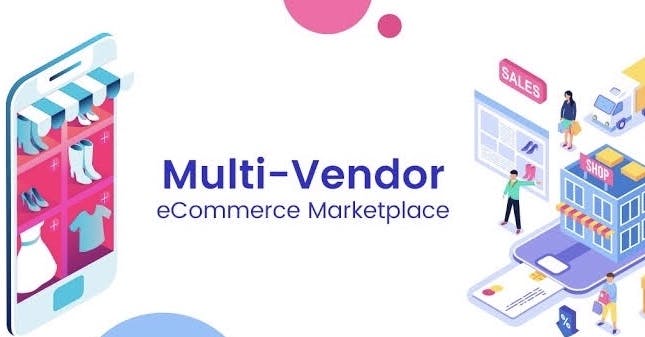
Benefits of Multivendor Marketplaces
Multivendor marketplaces offer several benefits to both sellers and customers. Let's explore some of the key advantages:
Increased Product Variety:
Multivendor marketplaces provide customers with a vast selection of products or services from multiple sellers. This variety allows customers to find unique, niche, or hard-to-find items in one convenient location, saving time and effort in their search.
Cost-Effective Business Model:
For sellers, participating in a multivendor marketplace offers a cost-effective way to enter the e-commerce space. Instead of building and maintaining an independent online store, sellers can leverage the existing infrastructure and customer base of the marketplace. This eliminates the need for substantial upfront investments in website development, marketing, and customer acquisition.
Enhanced Customer Reach:
Multivendor marketplaces attract a significant amount of traffic and have a broad customer base. For sellers, this means instant access to a larger pool of potential customers who may not have discovered their offerings otherwise. By joining a multivendor marketplace, sellers can tap into new market segments and geographical regions, expanding their reach and increasing sales potential.
Streamlined Operations:
Managing an e-commerce business involves various operational tasks, such as inventory management, order processing, and shipping logistics. Multivendor marketplaces streamline these processes by offering centralized inventory management systems, automated order processing, and integrated shipping solutions. Sellers can focus on sourcing quality products and providing excellent customer service, while the marketplace handles the technical aspects of order management.
Built-In Trust and Credibility:
Multivendor marketplaces often have established brand identities and trusted reputations. By operating within such a marketplace, sellers benefit from the built-in trust and credibility associated with the platform. Customers feel more confident making purchases from reputable multivendor marketplaces, which can lead to increased sales and customer loyalty for sellers.
Competitive Environment:
Multivendor marketplaces foster healthy competition among sellers. This competitive environment encourages sellers to continuously improve their products, pricing, and customer service. As a result, customers can benefit from competitive pricing, better quality products, and a higher level of customer satisfaction.
Marketing and Exposure:
Multivendor marketplaces typically invest in marketing efforts to attract and retain customers. Sellers can leverage the marketplace's marketing activities, which can include advertising campaigns, promotions, and search engine optimization. This exposure helps sellers increase their brand visibility and reach a wider audience without having to invest heavily in individual marketing initiatives.
Overall, multivendor marketplaces offer sellers increased product variety, a cost-effective business model, enhanced customer reach, streamlined operations, built-in trust and credibility, a competitive environment, and access to marketing and exposure opportunities. These benefits make multivendor marketplaces an attractive platform for sellers to grow their e-commerce businesses and provide customers with a diverse and seamless shopping experience.
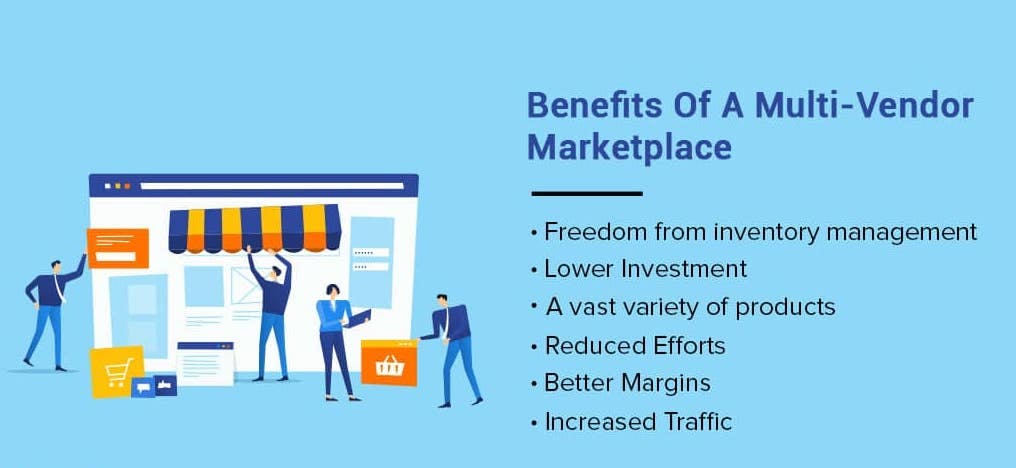
What is an example of a multivendor website?
One prominent example of a multivendor website is Etsy. Etsy is a popular online marketplace that specializes in handmade, vintage, and unique products. It provides a platform for independent sellers, known as Etsy sellers, to showcase and sell their creative products to a global customer base.
On Etsy, sellers can create their own shops within the marketplace, complete with customized branding and product listings. Customers can browse through a wide range of handmade crafts, vintage items, art, jewelry, clothing, home decor, and more. The platform offers various search and filtering options to help customers find the specific items they are looking for.
Etsy acts as an intermediary between sellers and buyers, facilitating secure transactions, handling payment processing, and providing customer support. The marketplace also features seller reviews and ratings, allowing customers to make informed decisions based on the experiences of previous buyers.
Etsy's success as a multivendor website lies in its focus on unique, handmade, and creative products, as well as its vibrant community of sellers and buyers. It has become a go-to destination for individuals looking for one-of-a-kind items and a platform for creative entrepreneurs to showcase their talents and reach a global audience.
Are Amazon and eBay multi vendor marketplaces?
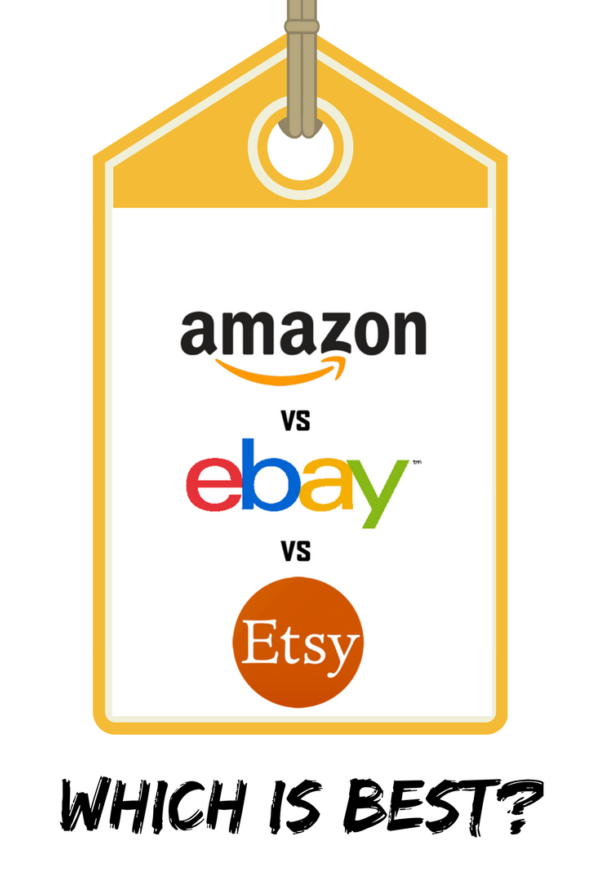
Both Amazon and eBay are considered multi-vendor marketplaces.
Amazon:
Amazon operates one of the largest and most well-known multi-vendor marketplaces in the world. It allows millions of third-party sellers to list and sell their products on the platform, alongside Amazon's own products. Sellers can create their own seller accounts, manage their inventory, and offer a wide range of products to Amazon's vast customer base.
eBay:
eBay is another prominent multi-vendor marketplace that connects multiple independent sellers with buyers. Sellers on eBay can create their own listings for products, set their prices, and manage their sales. Customers can browse through various sellers' offerings and make purchases directly from individual sellers on the platform.
Both Amazon and eBay exemplify the characteristics of multi-vendor marketplaces by providing a platform for numerous sellers to offer their products to a wide customer audience. These marketplaces have transformed the landscape of e-commerce and have become essential destinations for buyers looking for a diverse selection of products from different sellers in one place.
What is the difference between a single vendor and multi-vendor marketplace?
The main difference between a single-vendor marketplace and a multi-vendor marketplace lies in the number of sellers operating within the platform and the way products or services are offered to customers. Here's a breakdown of the distinctions:
Single-Vendor Marketplace:
In a single-vendor marketplace, there is only one seller or business offering products or services to customers.
The marketplace is typically owned and operated by that single vendor.
The seller has full control over the inventory, pricing, and fulfillment processes.
Customers can browse and purchase products directly from the single seller within the marketplace.
Examples of single-vendor marketplaces include the online stores of individual businesses or brands.
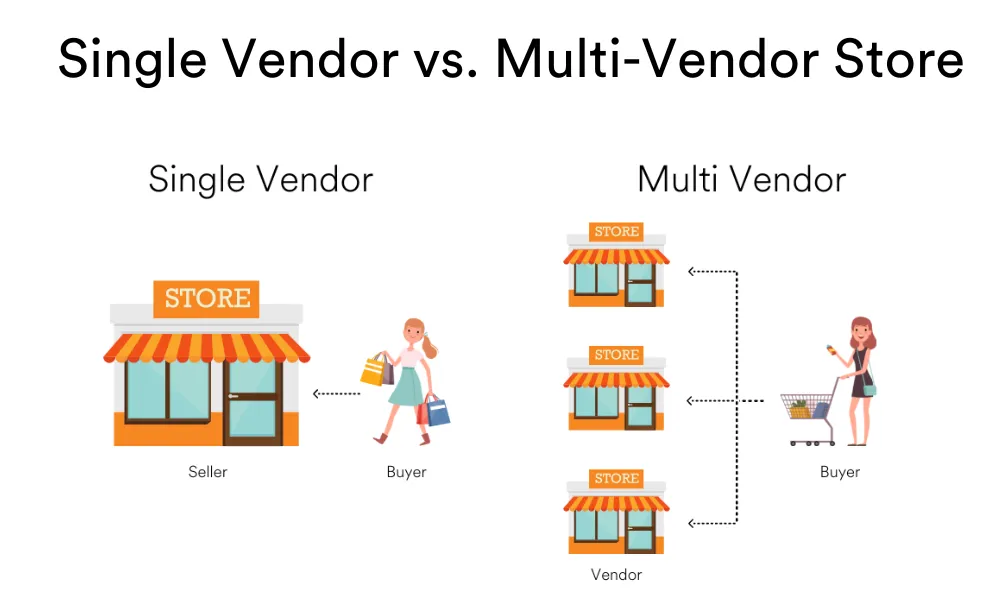
Multi-Vendor Marketplace:
In a multi-vendor marketplace, multiple independent sellers or businesses operate within the platform, each offering their own products or services.
The marketplace acts as an intermediary, connecting buyers with various sellers.
Each seller has their own dedicated store or profile within the marketplace.
Sellers manage their own inventory, pricing, and fulfillment processes independently.
Customers have access to a wide range of products or services from multiple sellers, all within a single platform.
Examples of multi-vendor marketplaces include Amazon Marketplace, eBay, Etsy, and Alibaba.
In summary, the key distinction is that a single-vendor marketplace involves a single seller offering products or services, while a multi-vendor marketplace involves multiple independent sellers operating within a single platform, providing customers with a broader selection of offerings from various sellers.
What is the difference between multi vendor and eCommerce website?
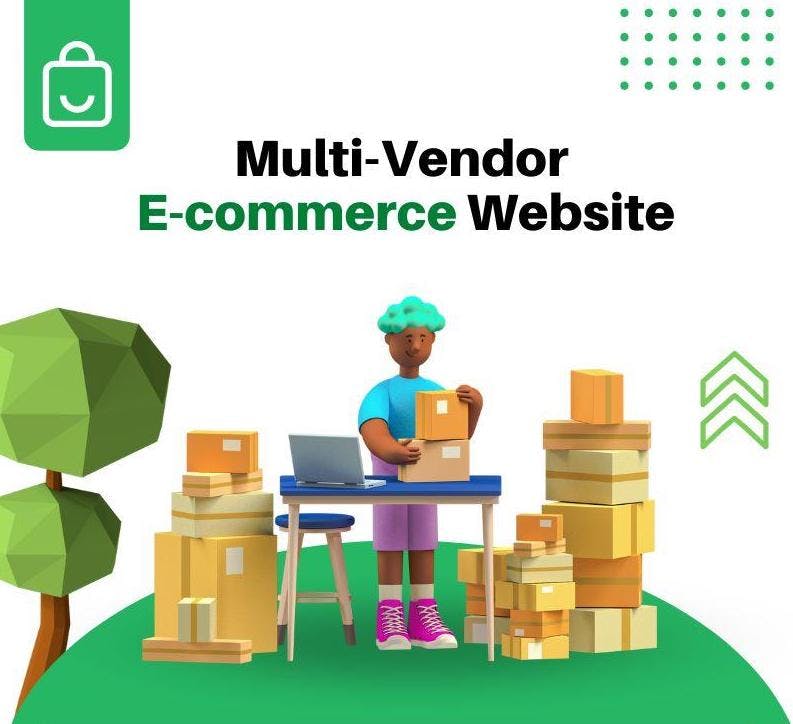
The difference between a multi-vendor marketplace and an e-commerce website lies in their primary focus and functionality:
Multi-Vendor Marketplace:
A multi-vendor marketplace is a platform that facilitates transactions between multiple independent sellers and customers.
The marketplace acts as an intermediary, connecting buyers and sellers, and provides a centralized platform for sellers to showcase and sell their products or services.
Sellers have their own dedicated profiles and listings within the marketplace, managing their inventory, pricing, and fulfillment processes independently.
Customers can browse through a wide range of products or services from different sellers and make purchases directly from those sellers within the marketplace.
Examples of multi-vendor marketplaces include Amazon Marketplace, eBay, and Etsy.
E-commerce Website:
An e-commerce website, on the other hand, typically refers to a website owned and operated by a single business or seller.
The website is dedicated to showcasing and selling products or services offered by that specific business.
The business has complete control over the inventory, pricing, and fulfillment processes.
Customers visit the website to browse the offerings and make purchases directly from the business.
Examples of e-commerce websites include the online stores of individual brands or businesses.
In summary, while both a multi-vendor marketplace and an e-commerce website involve selling products or services online, the key difference lies in the number of sellers and the structure of the platform. A multi-vendor marketplace connects multiple independent sellers with customers, while an e-commerce website represents a single business selling its own products or services.
Best Frequently Asked Questions (FAQs)
Multivendor marketplaces have emerged as powerful platforms that connect sellers and buyers in the e-commerce space. They offer numerous benefits, including increased product variety, cost-effective business models, enhanced customer reach, and streamlined operations. However, they also face challenges in maintaining seller quality, managing competitive dynamics, and handling order fulfillment. By understanding the intricacies of multivendor marketplaces and implementing effective strategies, entrepreneurs can harness the potential of these platforms and thrive in the dynamic world of e-commerce.
Leave your comment
Your feedback is very important to us. Share your thoughts on what you read, or tell your own story.
Rating